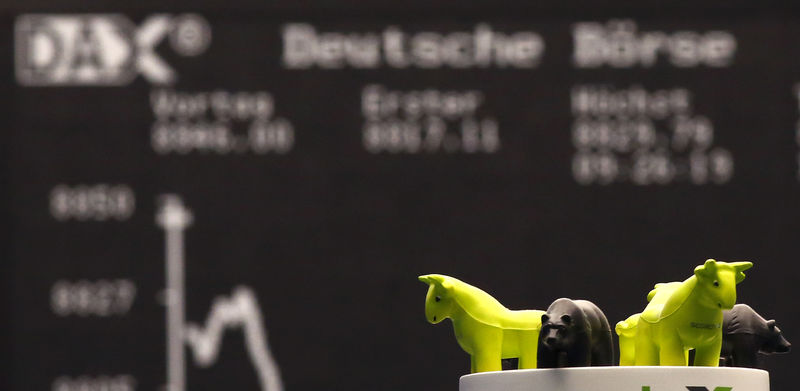This post was originally published on this site

Investing.com – European stock markets are expected to open in a mixed fashion Monday, starting the week on a cautious note amid concerns about slowing global growth after weak Chinese economic data.
At 02:00 ET (06:00 GMT), the DAX futures contract in Germany traded 0.1% lower, CAC 40 futures in France climbed 0.5% but the FTSE 100 futures contract in the U.K. fell 0.1%.
Economic data released earlier Monday showed China’s economic growth rate unexpectedly slowing in July, prompting the country’s central bank to cut key lending rates in a surprise move.
Industrial output grew 3.8% in July from a year earlier, with the growth rate below the 4.6% increase expected, while retail sales rose 2.7% from a year ago, missing forecasts for 5.0% growth and the 3.1% growth seen in June.
China’s economy, the world’s second largest, is struggling to shake off the June quarter’s hit to growth from strict COVID restrictions.
The European Central Bank raised interest rates by a half-point in July and is expected to do the same in September, even though the risk of a Eurozone recession has reached the highest level since November 2020 as energy shortages threaten to drive already record inflation higher still.
European stocks closed higher last week, helped by companies delivering largely better-than-expected results so far this quarter. This week sees the last big batch of earnings, with German consumer goods maker Henkel (ETR:HNKG) in the spotlight Monday.
Oil prices fell Monday, weighed by a potential increase in supply by oil giant Saudi Aramco (TADAWUL:2222) as well as concerns of slowing growth in China, the world’s second-largest economy.
Saudi Aramco stands ready to raise crude oil output to its maximum capacity of 12 million barrels per day if requested to do so by the Saudi Arabian government, Chief Executive Amin Nasser said Sunday, as the state-owned energy firm announced one of the largest quarterly profits in history.
Additionally, China’s economy unexpectedly slowed in July, triggering concerns about demand at the world’s largest crude importer, especially as refinery output tumbled to just over 12 million barrels per day, its lowest since March 2020.
By 02:00 ET, U.S. crude futures traded 1% lower at $91.17 a barrel, while the Brent contract fell 1% to $97.19.
Additionally, gold futures fell 0.4% to $1,808.25/oz, while EUR/USD traded 0.1% lower at 1.0246.


